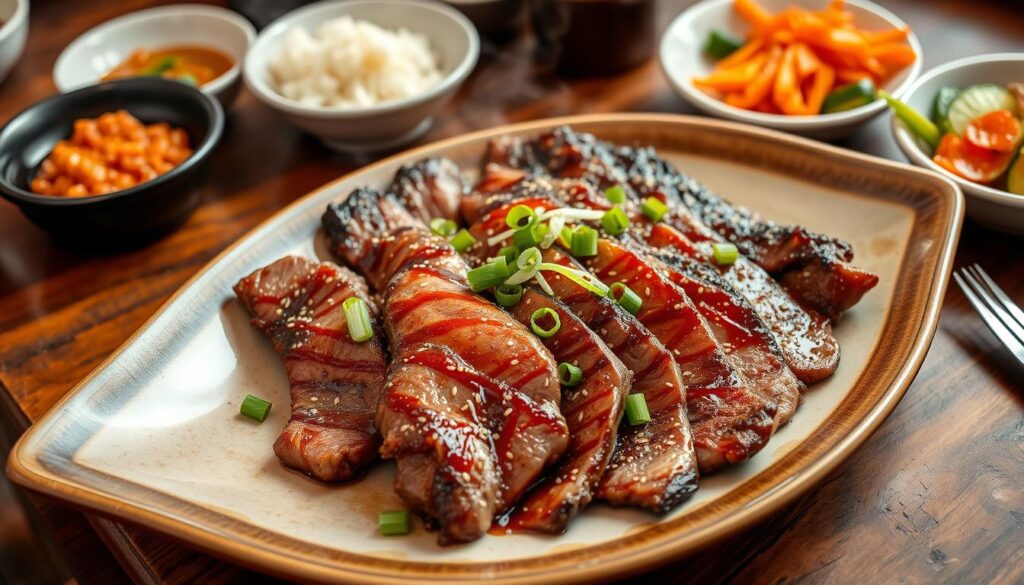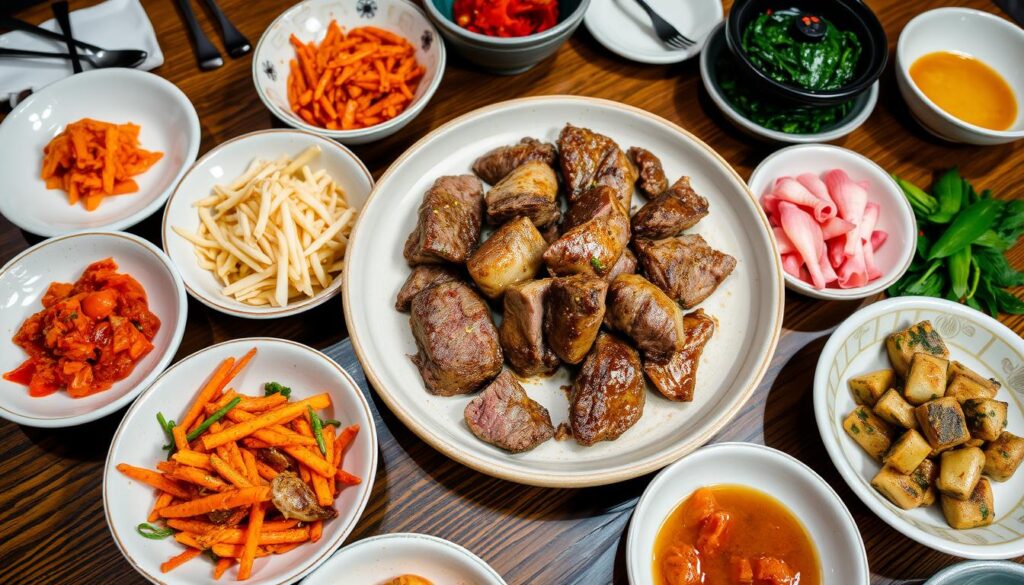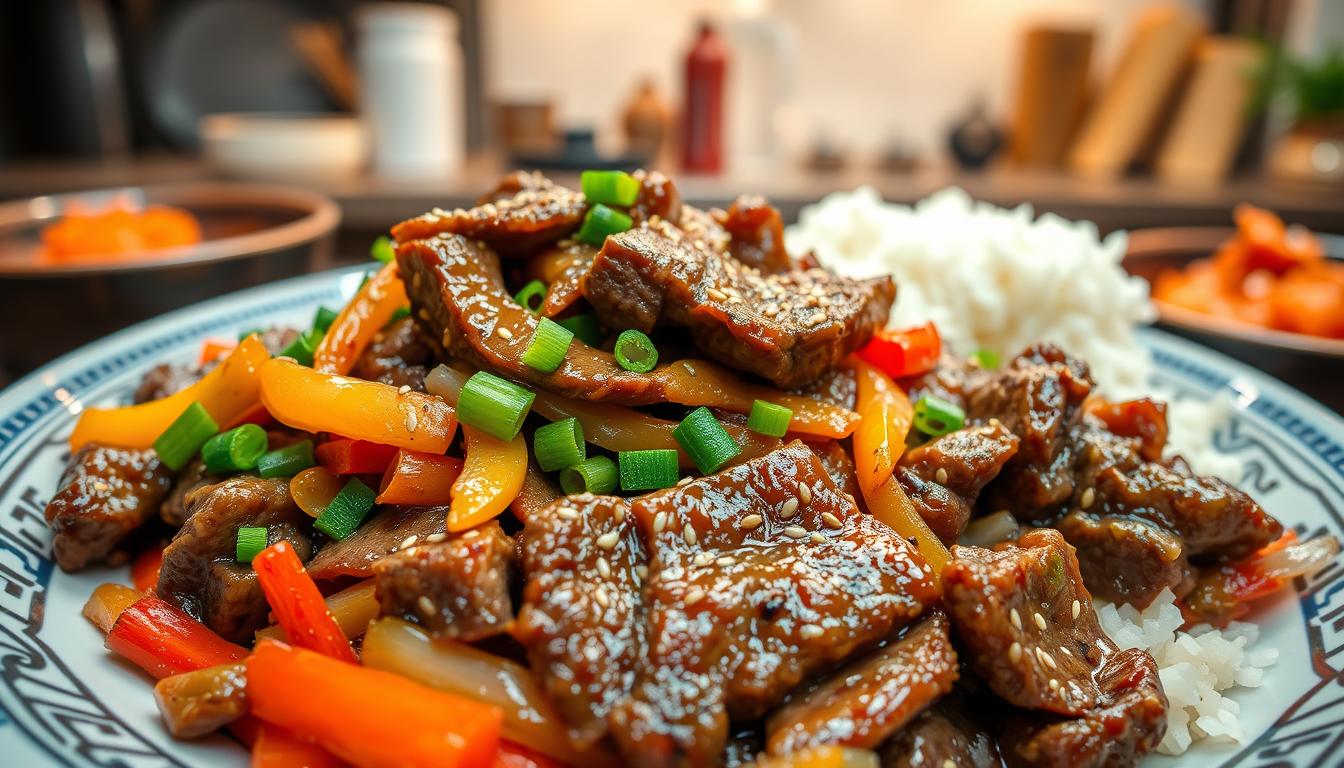The first time I tasted beef bulgogi, it was like a flavor explosion. It took me straight to the bustling streets of Seoul. This beef bulgogi recipe captures the essence of Korean BBQ. It’s tender, juicy meat marinated in sweet and savory flavors that make your taste buds dance.
If you’re craving an authentic Korean beef marinade, you’re in the right place. The easy bulgogi sauce is the secret that turns simple beef into a dish fit for a restaurant. You can make it right in your own kitchen.
Korean Beef Bulgogi is quick to prepare, taking just 15 minutes to cook. It’s a favorite in Korean BBQ, made with various beef cuts like flank steak, sirloin, or beef tenderloin. The key is thinly sliced meat marinated to perfection and cooked quickly over high heat.
Whether you’re new to cooking or a seasoned chef, this recipe will help you make a mouthwatering meal. It will impress your family and friends. Get ready to explore the delicious world of Korean cuisine, one bite of beef bulgogi at a time.
Table of Contents
What is Beef Bulgogi Recipe?
Beef bulgogi Recipe is a beloved Korean beef dish loved by many around the world. It turns simple ingredients into a delicious dish that highlights Korean flavors.
The word bulgogi means “fire meat” in Korean. It shows its roots as a grilled meat dish. Over time, it has become a favorite dish globally.
Origin and History
The history of bulgogi goes back to the Goguryeo era (37 BC-668 AD). It was first enjoyed by nobles and royal families. They used high-quality beef, sliced and marinated.
- Originated during the Goguryeo period
- Initially a dish for nobility
- Developed from traditional Korean meat preparation techniques
Popularity in Korean Cuisine
Today, beef bulgogi Recipe is a key part of Korean food culture. It’s loved for its mix of sweet, savory, and umami flavors.
| Characteristic | Details |
|---|---|
| Preferred Beef Cut | Boneless ribeye steak |
| Marination Time | 6-24 hours |
| Cooking Methods | Grilling, Pan Searing |
| Calories per Serving | 338 calories |
“Bulgogi is not just a dish, it’s a celebration of Korean culinary artistry.” – Korean Food Expert
Beef bulgogi Recipe is enjoyed in fancy restaurants and street food stalls alike. Its rich flavors and versatility make it a must-try for food lovers.
Key Ingredients for Beef Bulgogi Recipe
Making the best bulgogi recipe begins with picking the right ingredients. Your Korean beef marinade is the core of this dish. It turns simple meat into a flavorful feast.
Beef Cuts to Use
Choosing the right beef cut is key for authentic bulgogi. Here are some top picks:
- Denver steak
- Sirloin steak
- Flank steak
- Rib eye (best for its marbling)
Go for 350g of thinly-sliced beef. Make sure each slice is paper-thin for better marinating and quick cooking.
Essential Marinade Ingredients
The Korean beef marinade is a mix of flavors that tenderizes and boosts the meat’s taste. The main parts are:
- Soy sauce (3 tbsp)
- Asian pear (1/4 fruit) for sweetness
- Garlic (3 cloves)
- Sesame oil (1/2 tbsp)
- Brown sugar
- Mirin (1 tbsp)
Optional Add-Ins
Enhance your bulgogi with these extra ingredients:
- Green onions
- Sliced onions
- Carrots
- Gochujang for extra heat
- Red pepper flakes
“The secret to an incredible bulgogi is in the marinade’s balance of sweet, savory, and umami flavors.” – Korean Culinary Expert
Remember, marinate your meat for no more than 24 hours. Longer can ruin the meat’s texture and the dish’s quality.
Preparing the Marinade
Making an easy bulgogi sauce is key to a great Korean BBQ. The quick marinade turns regular beef into a dish that wows everyone.
To make a top-notch marinade, mix ingredients that offer sweet, savory, and umami tastes. Here’s what you need:
- Soy sauce for depth of flavor
- Brown sugar or honey for sweetness
- Sesame oil for nutty undertones
- Fresh garlic and ginger for aromatics
- Asian pear or apple for tenderizing
Mixing the Marinade Ingredients
When making your quick bulgogi marinade, be precise. First, finely chop garlic and ginger. Grate the Asian pear to tenderize the meat. Mix all liquid ingredients in a bowl, whisking until the sugar is fully dissolved.
“The secret to an amazing bulgogi is in the marinade’s balance of flavors” – Korean Cooking Experts
Marinating Time Recommendations
Patience is crucial when marinating bulgogi. For the best taste, let the meat marinate in the easy bulgogi sauce for:
- Minimum: 30 minutes for basic flavor infusion
- Optimal: 4-8 hours for deep flavor penetration
- Maximum: Overnight for maximum tenderness
Pro tip: Always marinate in the refrigerator to keep the meat safe and fresh.
Choosing the Right Beef
Starting a great bulgogi recipe means picking the right beef. The meat you choose can make or break this Korean dish. It’s key to pick the best cuts for a true and tasty meal.
Best Cuts for Bulgogi
For a beef bulgogi recipe, choose tender, marbled cuts. They promise flavor and tenderness. Here are the top picks:
- Ribeye (top choice for its exceptional marbling)
- Top sirloin (lean yet flavorful)
- Beef tenderloin (extremely tender)
- Skirt steak (for those seeking a more robust flavor)
“The secret to great bulgogi is in selecting a cut that’s both tender and flavorful.” – Korean BBQ Expert
How to Slice Beef Properly
Slicing beef for bulgogi needs precision and skill. You want thin, uniform strips. They should cook fast and soak up the marinade well.
- Partially freeze the beef for 2-2.5 hours
- Use a sharp knife to slice against the grain
- Aim for 2-3mm (1/8 inch) thickness
- Maintain consistent slice width
Pro tip: If you’re short on time, many Korean grocery stores offer pre-sliced bulgogi meat. While convenient, slicing your own ensures the freshest and highest-quality results for your beef bulgogi recipe.
The right cut and proper slicing technique can make your bulgogi extraordinary. Take your time, choose wisely, and you’ll create a Korean culinary masterpiece that will impress everyone at your table.
Cooking Methods for Beef Bulgogi
Traditional bulgogi beef can be cooked in many ways to make your dish amazing. Each method adds unique flavors and textures. This lets you make a meal that tastes like it came from a restaurant.
To make perfect bulgogi beef, you need to cook it carefully. This keeps it tender and flavorful. Knowing how to cook it right is key to a delicious meal.
Grilling Bulgogi: Outdoor BBQ Technique
Grilling adds a smoky taste that makes bulgogi even better. Here’s how to grill it perfectly:
- Preheat grill to medium-high heat
- Use a grill basket or skewers to prevent meat from falling through grates
- Cook 2-3 minutes per side for optimal tenderness
- Avoid overcrowding the grill
Stir-Frying: Quick and Convenient Method
Stir-frying is a fast way to cook bulgogi with little equipment:
- Use a well-seasoned cast iron skillet
- Cook on high heat for 3-5 minutes
- Work in small batches to ensure proper searing
- Keep meat moving to prevent burning
Broiling: Indoor Alternative
If you can’t grill outside, broiling is a good indoor option:
- Preheat broiler to high
- Place marinated meat on a lined baking sheet
- Broil 4-5 minutes per side
- Watch carefully to prevent burning
“The secret to perfect bulgogi is not just the marinade, but mastering your cooking technique.”
Cooking Temperature Tips
| Cooking Method | Temperature | Cooking Time |
|---|---|---|
| Grilling | Medium-High | 2-3 minutes per side |
| Stir-Frying | High | 3-5 minutes total |
| Broiling | High | 4-5 minutes per side |
No matter how you cook it, remember to use thin slices and high heat. This is the secret to tender and flavorful bulgogi beef.
Tips for Perfectly Cooked Bulgogi
To make delicious bulgogi beef, you need to be precise and pay attention to details. The secret to great bulgogi is mastering a few cooking techniques. These techniques make this traditional Korean dish truly exceptional.

Mastering Cooking Temperature
Getting the perfect bulgogi starts with controlling the heat. Your grill or skillet should be hot, but not too hot. This way, the homemade bulgogi sauce caramelizes well without making the meat tough.
- Preheat your grill or skillet to medium-high heat
- Ensure the cooking surface is evenly heated
- Use a cast-iron skillet for optimal heat distribution
Preventing Overcooking
To keep the bulgogi tender and juicy, don’t overcook it. Thin slices of meat cook quickly, in about 3-5 minutes. Keep an eye on the meat and take it off the heat as soon as it’s done.
“Patience and attention are the secret ingredients to perfect bulgogi.” – Korean Culinary Experts
Cooking Techniques
Here are some expert tips for cooking your bulgogi beef:
- Cook meat in small batches to prevent steaming
- Aim for a quick, high-heat sear
- Stir or flip meat frequently to ensure even cooking
By using these tips, you’ll make your homemade bulgogi sauce and meat into a dish that rivals any restaurant. It’s sure to wow your guests.
Serving Suggestions
Creating the perfect authentic bulgogi recipe is more than just cooking. It’s about serving it in a way that makes it unforgettable. This turns a simple dish into a feast for the senses.
Traditional Korean Accompaniments
In Korean cuisine, bulgogi is best with classic side dishes. The traditional way is simple yet flavorful. Your bulgogi can be served with:
- Steamed white rice
- Fresh lettuce leaves for wrapping
- Kimchi
- Korean ssamjang (dipping sauce)
- Pickled vegetable banchan
Creative Serving Ideas
You can also try new ways to enjoy bulgogi. This Korean beef marinade is perfect for creative cooking.
| Serving Style | Description |
|---|---|
| Bulgogi Tacos | Wrap in soft tortillas with fresh slaw |
| Bibimbap Bowl | Serve over rice with assorted vegetables |
| Sandwich Filling | Create a Korean-inspired sandwich with bulgogi |
| Pizza Topping | Use as a unique protein on Korean-style pizza |
The secret to a great bulgogi recipe is in the flavors. And it’s even better when shared with loved ones.
Making Bulgogi Bowls
Bulgogi bowls are a tasty way to enjoy beef bulgogi with lots of flavor. They mix protein, veggies, and rice into one dish. You can make them your own by choosing your favorite toppings.
Building the Perfect Bowl
To make a great bulgogi bowl, start with the right base. Use steamed white rice or cauliflower rice. These are perfect for holding the meat coated in easy bulgogi sauce.
- Start with 1 cup of cooked rice
- Add a generous portion of cooked beef bulgogi
- Layer fresh vegetables for crunch and nutrition
Toppings to Consider
The best part of bulgogi bowls is the toppings. They let you get creative with your meal. Here are some exciting options:
| Topping Category | Recommended Options |
|---|---|
| Fresh Vegetables | Cucumber slices, shredded carrots, spinach, bean sprouts |
| Protein Boost | Fried egg, additional grilled meat, tofu |
| Garnish | Sliced green onions, toasted sesame seeds, kimchi |
For more flavor, try adding gochujang or more bulgogi sauce. Each bite is a mix of sweet, savory, and spicy. It’s like a trip to Korea in your mouth.
Pro tip: Prepare components separately to keep ingredients fresh and allow for easy customization!
Pairing Bulgogi with Side Dishes
Enjoying traditional bulgogi beef is even better with the right side dishes and drinks. This Korean beef dish goes well with many sides. These sides bring out the flavors and make a complete meal.
Popular Korean Side Dishes
Korean cuisine has many side dishes that match bulgogi well. Here are some you should try:
- Kimchi – fermented cabbage with a spicy kick
- Japchae – sweet potato glass noodles
- Pickled radish – a refreshing palate cleanser
- Steamed rice – classic base for bulgogi
- Seaweed salad – light and nutritious
- Stir-fried zucchini – simple vegetable side
- Korean potato salad – creamy and delicious
- Soybean sprout salad – crunchy and fresh
Beverage Pairing Tips
Choosing the right drink can make your bulgogi meal better. Here are some drink options:
- Korean soju – traditional alcoholic spirit
- Light lager beer – crisp and refreshing
- Zinfandel or Shiraz – fruity red wines
- Barley tea (boricha) – non-alcoholic option
- Citrus-based drinks – cut through rich meat flavors

“The right side dishes transform a good meal into an extraordinary culinary journey.” – Korean Culinary Expert
Storing and Reheating Leftover Bulgogi
After enjoying your delicious beef bulgogi recipe, you’ll want to know the best ways to store and reheat your leftover Korean dish. Proper storage ensures your homemade bulgogi sauce maintains its incredible flavor and the meat stays tender.
Best Storage Practices
Storing your beef bulgogi correctly is crucial for maintaining its quality. Follow these guidelines:
- Cool the bulgogi to room temperature before storing
- Use airtight containers for refrigeration
- Refrigerate within 2 hours of cooking
- Store in the refrigerator for up to 3 days
- For longer storage, freeze for up to 2 months
Reheating Techniques
Reheating bulgogi requires careful attention to preserve its original texture and flavor. Here are the most effective methods:
- Stovetop Method:
- Heat a skillet over medium heat
- Add a small amount of water or broth
- Cook for about 5 minutes, stirring occasionally
- Oven Method:
- Preheat to 350°F
- Cover with aluminum foil
- Reheat for 15-20 minutes
- Microwave Method:
- Use medium power
- Add a tablespoon of water
- Heat in 30-second intervals
“The key to great reheated bulgogi is adding moisture and controlling the heat.”
Pro tip: Always bring your refrigerated bulgogi to room temperature before reheating to ensure even warming and preserve the meat’s tenderness.
Variations of Beef Bulgogi
An authentic bulgogi recipe doesn’t mean you’re limited to just one style. Korean beef marinade offers incredible flexibility. This allows you to explore delicious variations that can suit different dietary preferences and taste buds.
Spicy Bulgogi Options
For those who love a fiery kick, spicy bulgogi is a game-changer. You can transform your traditional recipe by adding gochugaru (Korean red pepper flakes) or gochujang (Korean chili paste) to your marinade. These ingredients will elevate your Korean beef marinade with a vibrant, spicy profile.
- Add 1-2 tablespoons of gochugaru for mild heat
- Use 2-3 tablespoons of gochujang for intense spiciness
- Adjust spice levels to your personal preference
Protein Alternatives
While beef is traditional, bulgogi can be incredibly versatile. You can easily swap beef with other proteins to create exciting variations:
- Pork Bulgogi (Dweji Bulgogi): A popular alternative with similar marinating techniques
- Chicken Bulgogi (Dak Bulgogi): Leaner option with the same delicious marinade
Vegetarian Bulgogi
Vegetarians can still enjoy the rich flavors of bulgogi by using meat substitutes. Firm tofu, mushrooms, seitan, or tempeh work wonderfully when prepared with the authentic bulgogi recipe marinade.
“The beauty of bulgogi lies in its adaptability while maintaining its core flavor profile.” – Korean Culinary Experts
Remember to adjust marinating times for non-meat options. Typically, tofu and vegetable alternatives require less marinating time to prevent becoming too soggy.
Conclusion: Enjoying Beef Bulgogi
Learning the best bulgogi recipe connects you to Korean cuisine’s rich history. It goes back to the Goguryeo era. Every time you make this dish, you join a tradition that has pleased many for centuries.
Try different beef cuts and perfect your marinade to get an authentic Korean taste. Whether grilling, pan-frying, or baking, focus on thin slices and good marinating. Your bulgogi can become a family favorite, bringing everyone together.
Sharing your bulgogi with friends and family introduces them to Korean cooking. Hosting a Korean BBQ night is a great way to show off your skills. Remember, the more you make bulgogi, the better you’ll get.
Making it a Family Favorite
Make bulgogi a regular dish that sparks conversations and creates memories. Serve it with kimchi and steamed rice, or try new sides. Bulgogi’s flexibility lets you tailor it to your family’s likes while keeping its Korean essence.
Sharing Your Bulgogi Experience
Share your bulgogi-making journey through photos and stories. Your enthusiasm can encourage others to try new dishes. It’s a great way to share your love for cooking and exploring cultures.
FAQ
What does bulgogi mean?
What cut of beef is best for bulgogi?
How long should I marinate the beef?
Can I make bulgogi with other meats?
What’s the best way to cook bulgogi?
How do I slice beef for bulgogi?
What are traditional sides to serve with bulgogi?
How long can I store leftover bulgogi?
Can I make bulgogi spicy?
What beverages pair well with bulgogi?
Source Links
- Korean Beef Bulgogi Recipe or Korean BBQ Beef [Video] – https://sweetandsavorymeals.com/korean-beef-bulgogi/
- Korean BBQ Beef Bulgogi Recipe – https://ourbestbites.com/korean-bbq-beef-bulgogi/
- Korean Beef Bulgogi Recipe – https://www.billyparisi.com/korean-beef-bulgogi-recipe/
- Korean Beef Bulgogi Recipe – https://www.spoonforkbacon.com/beef-bulgogi-recipe/
- Easy Beef Bulgogi Recipe {Korean BBQ Beef} – https://www.melskitchencafe.com/korean-beef-bulgogi/
- Beef Bulgogi Recipe (Homemade Korean BBQ Beef) – https://www.chilipeppermadness.com/recipes/beef-bulgogi-recipe/
- 15-Minute Beef Bulgogi {Authentic Korean Recipe} – The Big Man’s World ® – https://thebigmansworld.com/beef-bulgogi-recipe/
- Beef Bulgogi (Korean BBQ beef) | Iankewks – https://iankewks.com/beef-bulgogi-korean-bbq-beef/
- Bulgogi Recipe – https://cooking.nytimes.com/recipes/1017444-bulgogi
- Easy Korean BBQ Beef (Bulgogi) – A Well-Seasoned Kitchen® – https://www.seasonedkitchen.com/korean-bbq-beef
- Bulgogi Korean beef BBQ – https://www.maangchi.com/recipe/bulgogi/comment-page-1?_fooder_clipper=1&_f=1620000000000
- Korean BBQ-Style Beef Bulgogi At Home (Tender & Charred!) – https://playswellwithbutter.com/beef-bulgogi-recipe/
- Bulgogi Recipe (Korean Barbeque Beef) – https://www.anediblemosaic.com/bulgogi-recipe/
- The Best Authentic Korean Beef Bulgogi Recipe – https://www.thesavorychopstick.com/korean-beef-bulgogi/
- Korean Beef Bulgogi Recipe – https://www.askchefdennis.com/korean-beef-bulgogi-recipe/
- Bulgogi (Korean BBQ Beef) – https://mykoreankitchen.com/bulgogi-korean-bbq-beef/
- Caramelized Beef Bulgogi Bowl with Tender Steak & Rice | PWWB – https://playswellwithbutter.com/beef-bulgogi-bowl-recipe/
- Korean Bulgogi Bowls – Tastes Better From Scratch – https://tastesbetterfromscratch.com/korean-bulgogi-bowls/
- Bulgogi Beef Rice Bowl – easy gourmet by jackie – https://easygourmetbyjackie.com/bulgogi-beef-rice-bowl/
- Korean Beef Bowl Recipe – Chef Savvy – https://chefsavvy.com/korean-beef-bowls/
- What To Serve With Bulgogi: 15 Best Side Dishes – https://www.corriecooks.com/bulgogi-sides/
- Korean Tacos with Bulgogi Beef & Kimchi – https://www.platingsandpairings.com/korean-tacos-recipe/
- Master the Art of Reheating Bulgogi for Perfect Flavor and Freshness – https://discover.texasrealfood.com/leftover-makeover/best-way-to-reheat-bulgogi
- Authentic Beef Bulgogi – https://foodieandwine.com/korean-beef-bulgogi/
- Preserving Authentic Flavor: Best Methods to Reheat Korean Beef Bulgogi for Delicious Results – https://discover.texasrealfood.com/leftover-makeover/best-way-to-reheat-korean-beef-bulgogi
- How to Make Traditional Korean Bulgogi – Amazing Food & Drink – https://amazingfoodanddrink.com/recipes/traditional-korean-bulgogi/
- Ground Beef Bulgogi: 5 Irresistibly Delicious Reasons to Try – https://quickeatshub.com/ground-beef-bulgogi-recipe-in-minutes/

